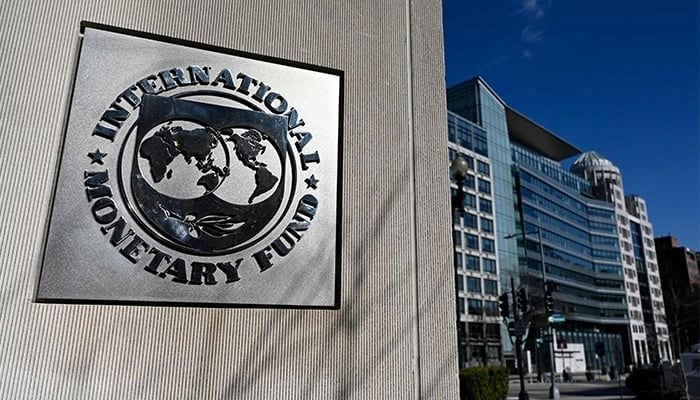Size and duration of the upcoming bailout package will be worked out by IMF’s review mission  This file photo taken on January 26, 2022, shows the seal for the International Monetary Fund (IMF) in Washington, DC. — AFP
This file photo taken on January 26, 2022, shows the seal for the International Monetary Fund (IMF) in Washington, DC. — AFP
ISLAMABAD: With augmentation of next bailout package through climate finance, Pakistan has decided to formally approach the IMF for the medium-term Extended Fund Facility (EFF) during the upcoming annual spring meetings of the Breton Wood Institutions (BWIs).
The size and duration of the upcoming bailout package will be worked out by the IMF’s review mission expected to hold talks, probably from the first week of May 2024 to finalize major contours of the upcoming bailout package. “We are all set to make a formal request to IMF during the upcoming annual spring meetings of BWIs known as the IMF and World Bank from April 15 to 20, 2024 in Washington D.C. as Pakistan’s delegation led by minister for finance will attend it,” top official sources confirmed while talking to The News on Tuesday.
The sources said Pakistan decided to make a request for augmenting the EFF through climate finance, so there was a possibility for securing $6 to $8 billion size of the upcoming program. “We are going to present our argument before the IMF management that Pakistan faced severe consequences of climate degradation and deserved support from the international community and donor agencies,” said the sources. Islamabad will make a request for the EFF with the possibility of augmenting through climate finance.
Meanwhile, Mohammad Al-Qahtani, CEO Saudi Arabia Holding Company, has stated in his post that Pakistan and Saudi Arabia have accelerated implementation of a massive $5 billion investment plan. Following the visit of Pakistani Prime Minister Shehbaz Sharif to Saudi Arabia and his meeting with Crown Prince Mohammed Bin Salman, the two countries agreed to expedite implementation of a massive investment plan worth $5 billion.
The agreements included the following: increasing Saudi deposits in the Central Bank of Pakistan from $3 billion to $5 billion, injecting investments into a new oil refinery and copper mines. These steps are part of a broader agreement previously reached, where Saudi Arabia is in talks to invest $21 billion in Pakistan. This includes establishing a copper mine at $7 billion and establishing an oil refinery at $14 billion. These investments are seen as a positive step towards strengthening economic relations between Pakistan and Saudi Arabia, supporting the Pakistani economy and creating new job opportunities.
Shehbaz Sharif described this agreement as “historic” and a “milestone” in the relationship between the two countries. The investments come at a time when Pakistan is facing a severe economic crisis, with high inflation rates and a shortage of foreign currency. Pakistan hopes that these investments will help improve its economy and create new job opportunities. Pakistan has a strong and reliable ally in Saudi Arabia which has been providing extensive financial and political support for a long time. These new investments signify the continued close cooperation between the two countries.
The sources said there was one IMF instrument under the Resilience and Sustainability Facility (RSF) which provided affordable long-term financing to countries undertaking reforms to reduce risks to prospective balance of payments stability, including those related to climate change and pandemic preparedness.
By reducing prospective balance of payment risks, an RSF arrangement aims to contribute to longer-term Balance of Payment (BoP) stability. In some cases, the RSF arrangements may also have an impact on short- and medium-term BoP needs.
The IMF staff should illustrate in program documentation risks to prospective BoP stability that may entail longer-term BoP financing needs associated with the relevant longer-term structural challenge. These risks are a qualification criterion for an RSF arrangement (though they are not related to access levels, which are governed by separate criteria. Leveraging diagnostics and available modelling tools, the staff should strive to illustrate the challenges to prospective BoP stability and substantiate the relevance of the proposed package of reforms to mitigating these prospective risks. Quantification, if feasible, is expected, but not required given inherent challenges. Where relevant, any direct short to medium-term BoP financing needs arising from the implementation of RSF-supported reforms. The staff should provide precise estimates and include them in the fiscal or BoP frameworks. Any positive impact on the BoP in the short-to-medium term RSF-supported reforms should also be captured to the extent possible.
Under the RSF, the IMF makes it mandatory that the debt must be assessed as sustainable over the medium term for the staff to recommend and the board to approve a new RSF request, augmentation of access and completion of reviews under RSF arrangements.
This scribe contacted the IMF spokesperson based in Washington D.C, last week and inquired whether Pakistan’s total public debt was sustainable. She referred to the last review of the IMF done under the Standby Arrangement (SBA) whereby the IMF termed the country’s debt within the ambit of sustainability. Pakistan’s total public debt is projected to rise to Rs120 trillion over the medium term as projected by the IMF over the next three to five years period.
Pakistan has also approved the Public Investment Management Assessment (PIMA) framework, including Climate-PIMA under the guidelines of the IMF’s technical report. Pakistan is committed to the IMF to improve its public investment management (PIM) to support economic growth and service delivery and make public infrastructure more sustainable and resilient to climate change. This assessment applies to the IMF’s Public Investment Management Assessment (PIMA) framework, including the Climate-PIMA module.











